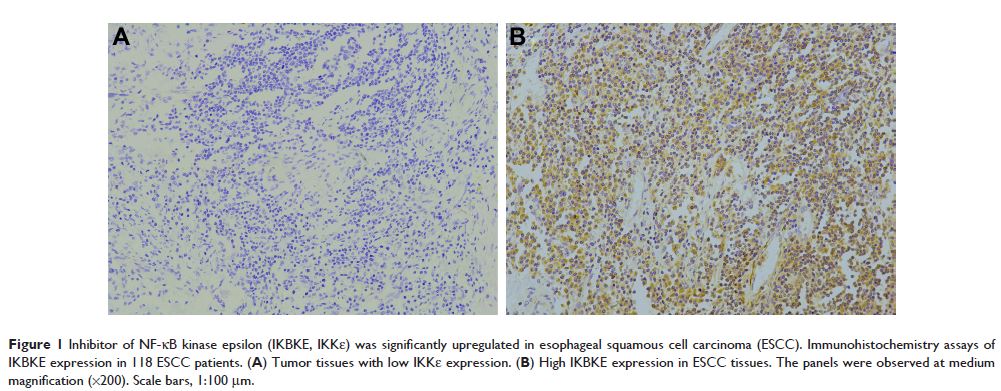108985
论文已发表
注册即可获取德孚的最新动态
IF 收录期刊
- 3.4 Breast Cancer (Dove Med Press)
- 3.2 Clin Epidemiol
- 2.6 Cancer Manag Res
- 2.9 Infect Drug Resist
- 3.7 Clin Interv Aging
- 5.1 Drug Des Dev Ther
- 3.1 Int J Chronic Obstr
- 6.6 Int J Nanomed
- 2.6 Int J Women's Health
- 2.9 Neuropsych Dis Treat
- 2.8 OncoTargets Ther
- 2.0 Patient Prefer Adher
- 2.2 Ther Clin Risk Manag
- 2.5 J Pain Res
- 3.0 Diabet Metab Synd Ob
- 3.2 Psychol Res Behav Ma
- 3.4 Nat Sci Sleep
- 1.8 Pharmgenomics Pers Med
- 2.0 Risk Manag Healthc Policy
- 4.1 J Inflamm Res
- 2.0 Int J Gen Med
- 3.4 J Hepatocell Carcinoma
- 3.0 J Asthma Allergy
- 2.2 Clin Cosmet Investig Dermatol
- 2.4 J Multidiscip Healthc

术前 IKBKE 表达对食管鳞状细胞癌中的预后意义
Authors Yang WJ, Qu Y, Tan BX, Jia YB, Wang NN, Hu P, Wang JB
Received 12 November 2017
Accepted for publication 18 January 2018
Published 7 March 2018 Volume 2018:11 Pages 1305—1314
DOI https://doi.org/10.2147/OTT.S156818
Checked for plagiarism Yes
Review by Single-blind
Peer reviewers approved by Dr Amy Norman
Peer reviewer comments 2
Editor who approved publication: Dr Ingrid Espinoza
Purpose: IκB kinase epsilon (IKBKE; IKKε), a member of the nuclear factor-κB
kinase inhibitor family, is upregulated in several human cancers, including
breast cancer, prostate cancer, and ovarian cancer. Esophageal squamous cell
carcinoma (ESCC) is one of the most common and most aggressively malignant
cancers with dismal prognosis. However, the state of IKBKE expression in ESCC
is still unknown and its potential value remains unexplored.
Patients and methods: IKBKE protein expression was evaluated by
immunohistochemistry in 118 paraffin specimens of ESCC treated by curative
surgery. All patients were regularly followed up by telephone over 3 years
after surgery. The chi-square test, Kaplan–Meier method, and Cox proportional
hazard regression model were used to analyze the relationship of IKBKE
expression, clinicopathological characteristics, and prognostic value for ESCC.
Results: IKBKE expression was 61.9% (73/118) in
paraffin-embedded archived ESCC. Its expression was significantly associated
with tumor differentiation grade (p =0.045) and
advanced TNM (pathologic tumor node metastasis) stages (p =0.023). In univariate analysis,
IKBKE expression was closely associated with decreased 3-year disease-free survival
(HR 1.804, 95% CI 1.076–3.027; p =0.023) and
overall survival (HR 2.118, 95% CI 1.189–3.773; p =0.009). Meanwhile, in
multivariate analysis it was identified as an independent prognostic factor for
3-year disease-free survival (HR 1.777, 95% CI 1.034–3.054; p =0.037) and overall survival (HR
2.078, 95% CI 1.138–3.796; p =0.017).
Conclusion: Our data indicated for the first time that IKKε
expression is a highly recurrent event in ESCC and could play a pivotal role in
the evaluation of prognosis. IKBKE upregulation is negatively associated with
disease-free survival and overall survival. Therefore, IKBKE could serve as a
prognostic variable and potential therapeutic target for this malignancy.
Keywords: IKBKE,
esophageal squamous cell carcinoma, biomarker, prognosis, immunohistochemistry
